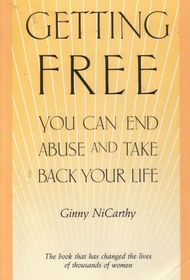Janet R. (janetar) reviewed Getting Free: You Can End Abuse and Take Back Your Life on + 97 more book reviews
Helpful Score: 1
This is a helpful book to read.
Helpful Score: 1
I'm sorry if anyone needs this book. Been there, done that, still paying for the T-shirt (in the middle of a divorce after 30 VERY abusive years). This book helped me to open my eyes and truly "get free".
Helpful Score: 1
Every woman in experiencing violence in her own home needs this book to
guide her out of there! Practical step by step instruction on escape
planning, getting a restraining order, what paperwork to take with you,
on and on! our family violence shelter recommends it to every woman.
guide her out of there! Practical step by step instruction on escape
planning, getting a restraining order, what paperwork to take with you,
on and on! our family violence shelter recommends it to every woman.




